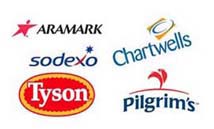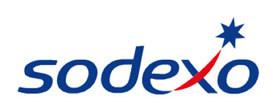By Lucy Komisar
Dec 14, 2019
Democrats seeking the party‘s nomination for president have run up against a real-live example of what they should be talking about: exploitation of workers. Their Thursday debate is scheduled to take place at Loyola Marymount University in Los Angeles, but Unite Here Local 11 announced members would picket the food service provider, the French multinational Sodexo, which employs 150 cooks, dishwashers, cashiers and servers at the university. Negotiations that began in March, dealing with issues such as pay and affordable health insurance, stalled when the company cancelled recent talks. All the candidates said they would not cross the line.
But they should know more about Sodexo. It is a documented thief, stealing from universities, schools, hospitals, even the military. Here is the article I wrote in 2011 for the New York Times. And a link to an earlier, more detailed one based on two Sodexo whistleblowers, for In These Times. The revelations led to a $20-million settlement in New York State. Authorities in other localities seem to have ignored the corruption that I exposed.

How the Food Industry Eats Your Kid‘s Lunch
By Lucy Komisar
The New York Times, Dec 3, 2011
An increasingly cozy alliance between companies that manufacture processed foods and companies that serve the meals is making students ” a captive market ” fat and sick while pulling in hundreds of millions of dollars in profits. At a time of fiscal austerity, these companies are seducing school administrators with promises to cut costs through privatization. Parents who want healthier meals, meanwhile, are outgunned.
Each day, 32 million children in the United States get lunch at schools that participate in the National School Lunch Program, which uses agricultural surplus to feed children. About 21 million of these students eat free or reduced-price meals, a number that has surged since the recession. The program, which also provides breakfast, costs $13.3 billion a year.

companies rake off the profits.
Sadly, it is being mismanaged and exploited. About a quarter of the school nutrition program has been privatized, much of it outsourced to food service management giants like Aramark, based in Philadelphia; Sodexo, based in France; and the Chartwells division of the Compass Group, based in Britain. They work in tandem with food manufacturers like the chicken producers Tyson and Pilgrim‘s, all of which profit when good food is turned to bad.
Here‘s one way it works. The Agriculture Department pays about $1 billion a year for commodities like fresh apples and sweet potatoes, chickens and turkeys. Schools get the food free; some cook it on site, but more and more pay processors to turn these healthy ingredients into fried chicken nuggets, fruit pastries, pizza and the like. Some $445 million worth of commodities are sent for processing each year, a nearly 50 percent increase since 2006.
The Agriculture Department doesn‘t track spending to process the food, but school authorities do. The Michigan Department of Education, for example, gets free raw chicken worth $11.40 a case and sends it for processing into nuggets at $33.45 a case. The schools in San Bernardino, Calif., spend $14.75 to make French fries out of $5.95 worth of potatoes.
The money is ill spent. The Center for Science in the Public Interest has warned that sending food to be processed often means lower nutritional value and noted that “many schools continue to exceed the standards for fat, saturated fat and sodium.” A 2008 study by the Robert Wood Johnson Foundation found that by the time many healthier commodities reach students, “they have about the same nutritional value as junk foods.”
Monica Zimmer, a Sodexo spokeswoman, said that “much has changed” since those studies, pointing to the company‘s support for “nutrition education to encourage young students to eat more fruits and vegetables.”

companies hurt children, workers.
Roland Zullo, a researcher at the University of Michigan, in a study in 2008 he showed that Michigan schools that hired private food-service management firms spent less on labor and food but more on fees and supplies, yielding “no substantive economic savings.” Alarmingly, he even found that privatization was associated with lower test scores, hypothesizing that the high-fat and high-sugar foods served by the companies might be the cause. In a later study in 2010, Dr. Zullo found that Chartwells was able to trim costs by cutting benefits for workers in Ann Arbor schools, but that the schools didn‘t end up realizing any savings.
Why is this allowed to happen? Part of it is that school authorities don‘t want the trouble of overseeing real kitchens. Part of it is that the management companies are saving money by not having to pay skilled kitchen workers.
In addition, the management companies have a cozy relationship with food processors, which routinely pay the companies rebates (typically around 14 percent) in return for contracts. The rebates have generally been kept secret from schools, which are charged the full price.
Last year, Andrew M. Cuomo, then the New York State attorney general, won a $20 million settlement over Sodexo‘s pocketing of such rebates. Other states are following New York and looking into the rebates; the Agriculture Department began its own inquiry in August.

With the crackdown on these rebates, food service companies have turned to another accounting trick. I found evidence that the rebate abuses are continuing, now under the name of “prompt payment discounts,” under an Agriculture Department loophole. These discounts, for payments that are often not prompt at all, are really rebates under another name. New York State requires rebates to be returned to schools, but the Sodexo settlement shows how unevenly the ban has been enforced.
The food service companies I spoke with denied any impropriety. “Our culinary philosophy, as a company, is to promote scratch cooking where possible and encourage variety and nutritionally balanced meals,” said Ayde Lyons, a Chartwells spokeswoman. “We use minimally processed foods whenever possible.”
There are economic and nutritional consequences to privatization. School kitchen workers are generally unionized, with benefits; they are also typically local residents who have children in public schools and care about their well-being. Laid-off school workers become an economic drain instead of a positive force. And the rebate deals with national food manufacturers cut out local farmers and small producers like bakers, who could offer fresh, healthy food and help the local economy.
Children pay the price. Dr. Zullo found that privately managed school cafeterias offered meals that were higher in sugar and fats and made unhealthy snack items ” soda, cookies, potato chips ” more readily available. The companies were also less likely to use reduced-sugar recipes. Linda Hugle, a retired school principal in Rogue River, Ore., told me that when her district switched to Sodexo, “the savings were paltry.” She added, “You pay a little less and your kids get strawberry milk, frozen French fries and artificial shortening.”

Advocates who fight for better food face an uphill battle. Dorothy Brayley, executive director of Kids First, a nutrition advocacy group in Pawtucket, R.I., told me she encountered resistance in trying to persuade Sodexo to buy from local farmers. (Sodexo says it does buy some local produce and has opened salad bars in many schools.) Donna D. Walsh, a former school board president in Westchester County, N.Y., told me she worked with a supportive superintendent to get Aramark to stop deep-frying food and to open a salad bar. But after a new superintendent came in, she said, the company went back to profit-driven menus of pizza and bagels.
The federal government could intervene. The Agriculture Department proposed new rules this year that would set maximum calories for school meals; require more fruits, vegetables and whole grains; and limit trans fats.
Not surprisingly, the most committed foes of the rules are the same corporations that make money supplying bad food. Aramark, Sodexo and Chartwells, as well as food processing companies like ConAgra, wrote letters arguing, among other things, that children may not want to eat healthier food.
Any increase in fruit and vegetables might result in “plate waste,” wrote Sodexo. A protein requirement at breakfast, Aramark said, would hamper efforts to offer “popular breakfast items.” Their lobbying persuaded members of Congress to block a once-a-week limit on starchy vegetables and to continue to allow a few tablespoons of tomato sauce on pizza to count as a vegetable serving. Thanks to that cave-in, children will continue to get their vegetables in the form of potatoes for breakfast and pizza for lunch.
One-third of children from the ages of 6 to 19 are overweight or obese. These children could see their life expectancies shortened because of their vulnerability to diabetes, heart disease and cancer. Unfortunately, profit, not health, is the priority of the food service management companies, food processors and even elected officials. Until more parents demand reform of the school lunch system, children will continue to suffer.
This article was written support from The Investigative Fund, a project of the Nation Institute.
Story on New York Times website. I added some photos on this post.
“Cafeteria Kickbacks,” an earlier article published in 2009 by In These Times. And on my website here.
As the result of this exposé, New York State sued Sodexo and in 2010 got a $20 million settlement. Here is that story.
Sodexo, exposed by Komisar for kickbacks, agrees to $20m settlement
By Lucy Komisar
July 21, 2010
The global food services company Sodexo, which I exposed last year for exacting “rebates” from suppliers and charging clients full price, has agreed to a $20 million settlement with the New York Attorney General for that illicit practice.
Attorney General Andrew Cuomo today said the company had overcharged 21 New York school districts as well as the State University of New York system.
He found that the company promised to provide goods at cost but failed to acknowledge rebates from suppliers, resulting in illegal overcharges to the schools.
The settlement was unsealed in Federal Court in Massachusetts and is the largest monetary settlement under the Act that does not involve Medicaid funds. Two whistleblowers, John and Jay Carciero, who worked for Sodexo, had brought a “qui tam” lawsuit against Sodexo in federal court in Boston and filed charges under the New York False Claims Act.
Sodexo‘s policy of eliciting kickbacks (called “rebates”) from suppliers but improperly charging full price to clients such as schools, hospitals, colleges and private businesses, was described in my article, “Cafeteria Kickbacks,” which appeared in the March 2009 issue of “In These Times,” a monthly magazine.
The article was prompted by internal documents provided exclusively to me by the Carciero brothers.
It drew on interviews with the Carcieros and with dozens of others who had direct knowledge of the system. That number included small business people who were excluded from selling to schools and other purchasers because they could not match the kickbacks provided to Sodexo by large corporations. It included suppliers who were offering more healthy foods than the less nutritional products Sodexo preferred because they provided greater “rebates.”
When I was writing the article, I sent Sodexo officials copies of the key internal documents that described the kickback system, and they raised no challenge to their authenticity. The Sodexo counsel said the system was not “abusive.” My “In These Times” article and the New York Attorney General came to the conclusion that it was.
According to the Attorney General, “The 21 schools and the SUNY system contracted with Sodexo to provide food services, vending and facilities services. An investigation by Attorney General Cuomo‘s Office determined that from September 1, 2004 through August 31, 2009, Sodexo received significant rebates from its suppliers without acknowledging or passing the savings on to these schools ” in violation of the contracts, as well as state and federal laws.”
The 21 K-12 schools participate in the New York State Education Department‘s Child Nutrition Programs and the National School Lunch Program, which require that rebates, credits and discounts be credited to the schools. On average, Sodexo received 14 percent rebates from its suppliers.
The settlement funds will be distributed to the whistleblowers ” the Carcieros ($3.6 million), New York State ($15 million) and the impacted school districts.
Sodexo must also implement greater transparency in the contracting process and create built-in safeguards to ensure that clients are informed about rebates. The company must:
â— Disclose in future contracts with public entities that it is receiving rebates and indicate whether rebates will be retained by Sodexo or credited to the client;
â— Provide written disclosure to school district clients for the next two years that it is receiving off-invoice rebates;
â— Establish a hotline for clients to call with any questions concerning rebates;
â— Pay for an independent auditor‘s review of its off-invoice rebate program for the next three years.
Sodexo is among the world‘s largest food services companies and the world‘s largest private food purchaser, with more than 313,000 employees serving 6,000 clients.
The school districts and the amounts they will get are:
Children‘s Village and Abbott House (Westchester County): $1.03 million
Albion CSD (Orleans County): $2,918
Cheektowaga – Maryvale (Erie County): $2,806
Cleveland Hill Union FSD (Erie County): $1,757
Dunkirk City School District (Chautauqua County): $2,210
Elmwood Franklin School (Erie County): $1,264
Lackawanna City School District (Erie County): $11,597
Lakeshore CSD (Erie County): $26,022
Letchworth (Wyoming County): $1,370
Lewiston Porter CSD (Niagara County): $2,113
Lockport City School District (Niagara County): $7,551
Medina CSD (Orleans County): $2,022
North Tonawanda (Niagara County): $12,121
Royalton – Hartland CSD (Niagara County): $2,440
Salamanca City School District (Cattaraugus County): $2,637
Schenectady City School District (Schenectady County): $14,044
Sodus City School District (Wayne County): $2,397
Springville – Griffith CSD (Erie County): $2,874
Tonawanda City School District (Niagara County): $3,541
Tuckahoe Union FSD (Westchester County): $8,556
JCCA – Buffalo (Erie County): $59,381


